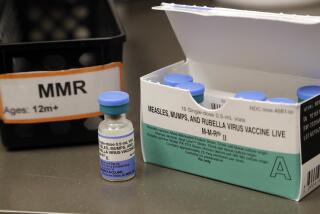HIV Cases on Rise Among Children
- Share via
Los Angeles County health officials have received 18 new reports of HIV infections among children this year, exceeding the annual total for each of the last three years.
Although the number represents a setback, none of the new cases is among babies born this year. Eight of the children were born in 2000 and 2001. Two of them are siblings and their mother declined HIV testing during her pregnancies because she thought she was not at risk.
Largely because of aggressive treatment -- including use of the drug AZT -- 55 virus-free babies were born this year to HIV-positive mothers, said Dr. Toni Frederick, chief epidemiologist with the county’s pediatric HIV project.
Still, health experts reiterated an urgent plea issued in February -- after receiving seven reports of HIV in children -- that pregnant women be tested and treated for the virus that causes AIDS.
By comparison, county officials received seven case reports in all of last year, 14 in 2000 and 11 in 1999. Thirty-two HIV cases among children were reported in 1998.
A new finger-prick HIV test, approved by the federal government Thursday, could help. It provides results within 20 minutes, unlike current products that sometimes take days to process.
By taking anti-AIDS drugs during pregnancy and delivery, giving medication to their babies and avoiding breast-feeding after birth, HIV-positive women can cut the chances of passing the virus to newborns to less than 1%.
If untreated, a woman has a 20% to 25% chance of transmitting HIV to her unborn child.
The newly reported cases in Los Angeles County have renewed a debate over whether California ought to make HIV testing of pregnant women a regular part of prenatal care, unless women refuse.
“We committed those 18 children in Los Angeles County this year to death because nobody was prepared to step up and say, ‘We’re interested in protecting the children,’ ” said outgoing Assemblyman Rod Wright (D-Los Angeles), who sponsored a bill that would have mandated such testing.
Davis vetoed the bill this fall, saying the “current universal voluntary system seems to be working well.”
“I support the goal of more testing, but I believe this bill represents a fundamental shift from voluntary testing toward a mandatory system, which may reduce an at-risk woman’s willingness to receive prenatal care,” the governor wrote.
Health officials noted some peculiarities among the newly reported cases in Los Angeles County. Three children were born outside the United States, and three more moved to Los Angeles from other cities where they had been diagnosed.
The mothers of two children tested negative for HIV during their pregnancies, meaning they had been infected too recently for the virus to show up or were infected after being tested.
The oldest pediatric case reported this year was a boy in his late teens who may have contracted the disease from a blood transfusion. Also, officials learned of a preteen girl’s infection only after the child’s mother began showing symptoms of AIDS.
“The child went 10 years without having anything that a physician picked up” as being indicative of HIV, Frederick said. “We see that they can live asymptomatically for a number of years without coming to medical attention.”
Frederick said the new cases show that doctors must not become complacent about pediatric HIV cases. “The medical world needs to be aware that it’s still something that needs to be on their radar screen for both children and mothers, and really for fathers,” she said.
The county’s Office of AIDS Programs and Policy has created an initiative, called promotoras, in which Latino and black women volunteer to discuss HIV with friends and neighbors at the grocery store, self-service laundry, beauty salon and other gathering spots.
“It’s a model based on peer education, from a woman to another woman,” said Armida Ayala, a researcher in charge of the program. “Our main theme is to get women into prenatal care so they get tested for HIV.”
In 2001, 83 HIV-positive women were treated with the medication AZT during labor and delivery, and none of their babies was infected. All of the six infected babies born in 2001 had mothers who did not receive treatment.
More to Read
Sign up for Essential California
The most important California stories and recommendations in your inbox every morning.
You may occasionally receive promotional content from the Los Angeles Times.










